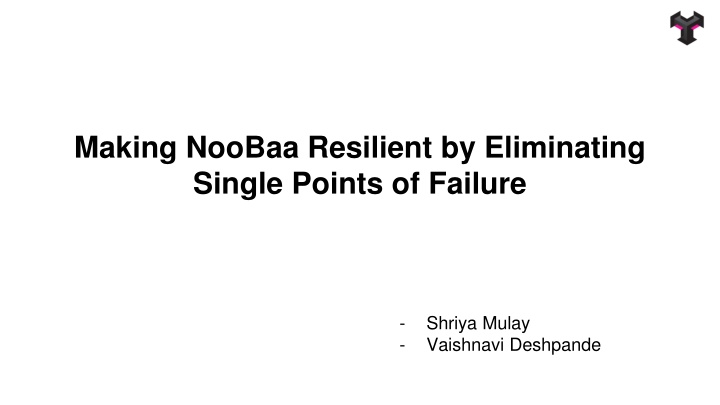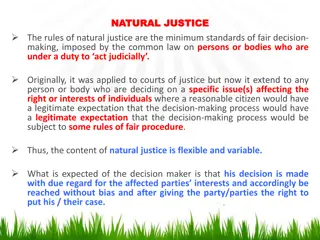
Enhancing NooBaa Resilience: Eliminating Single Points of Failure
Discover how NooBaa, a software-defined storage platform, ensures seamless object storage management across various environments, such as Multi-Cloud, by mitigating Single Points of Failure (SPOF). Explore its architecture, advantages, and strategies for increased resilience.
Download Presentation

Please find below an Image/Link to download the presentation.
The content on the website is provided AS IS for your information and personal use only. It may not be sold, licensed, or shared on other websites without obtaining consent from the author. If you encounter any issues during the download, it is possible that the publisher has removed the file from their server.
You are allowed to download the files provided on this website for personal or commercial use, subject to the condition that they are used lawfully. All files are the property of their respective owners.
The content on the website is provided AS IS for your information and personal use only. It may not be sold, licensed, or shared on other websites without obtaining consent from the author.
E N D
Presentation Transcript
Making NooBaa Resilient by Eliminating Single Points of Failure - - Shriya Mulay Vaishnavi Deshpande
Table of content: Introduction to NooBaa NooBaa Architecture Understanding Single Point of Failure (SPOF) Mitigating Single Point of Failure in NooBaa
Introduction to NooBaa NooBaa is a software-defined storage platform that enables seamless management of object storage across diverse environments. Multi-Cloud i.e, AWS,azure, gcp and/or any consumable storage. NooBaa uses bucket policies which provides multi cloud capabilities like placement (mirroring, tiering,namespace),dedupe,compression. The goal is to simplify the data flows by connecting to any storage from public/private clouds providing scalable services using same s3 API and management tools
Why Noobaa ? Multicloud Solution: Eliminates Vendor lock-in. NooBaa provides an AWS S3-compatible API, the de facto standard, independent of any specific vendor or location. Multi-cloud approach also increases availability by allowing you to keep your data in multiple locations while using a single access endpoint. Storage Orchestration : NooBaa can consume data from AWS S3, Microsoft Azure Blobs, Google Storage or any AWS S3 compatible storage Private Cloud. NooBaa buckets have placement policies which determines where the data should be placed. Bucket policies can be modified dynamically NooBaa offers compression,deduplication,encryption on top of existing storage layer. Agililty : Migrate the data without any disruption in the services. Workloads : media, backup,archiving,
Noobaa Overview DEPLOY AND MANAGE DATA SERVICES App Multi-Cloud Buckets S3 API App Hybrid Buckets App Multi-site Buckets 5
Compress Dedupe S3 Write Fragment Encrypt Store London DC New York DC Paris DC
Noobaa core components NooBaa core - The brain NooBaa db - The database NooBaa endpoint - The s3 server NooBaa agent
HIGH LEVEL ARCHITECTURE Noobaa architecture Scalable NooBaa Endpoint S3 / Lambda API auth, chunking, dedupe, compress, encrypt Application HIGH LEVEL ARCHITECTURE NooBaa Core Optimized utilization, resilience, performance, locality, economics, etc. Data path Cloud Resource AWS S3 AWS S3-compatible, Azure Blob, Google cloud storage Ceph Storage NooBaa db Stores bucket metadata, configuration, analytics, etc. Scalable NooBaa Storage Node stores chunks, runs lambda functions, monitors host, sends heartbeats 8
NooBaa Database metadata : NooBaa Maintains below metadata : Configurations Accounts and Access Keys Bucket and Bucket Policies Backingstores and Cloud Connections Objects : Mapping objects to storage locations Encryption Keys Analytics : System Status and statistics
Understanding Single Point of Failure (SPOF) Noobaa DB stores critical metadata, such as the location of objects. NooBaa database storage is scalable to handle increased load, ensuring flexibility. Every operation of the NooBaa pass through database so incase any failure or corruption in that can lead to a disconnection between the data and I/O, resulting in system failure. If the database layer is corrupted, it impacts overall NooBaa operations, creating a potential single point of failure.
Symptoms of noobaa db corruption 1. NooBaa db pod fails to come up : MountVolume.MountDevice failed for volume "pvc-437a28c9-7095-42a1-8831-b8fd1ff93aa4" : rpc error: code = Internal desc = 'fsck' found errors on device /dev/rbd0 but could not correct them: fsck from util-linux 2.37.4 1. NooBaa db pod fails to start with : 2023-05-15T07:15:46.141871149Z pg_ctl: could not start server 2023-05-15T07:15:46.141871149Z Examine the log output. Pgsql logs : 2023-05-15 09:23:16.742 UTC [24] PANIC: could not locate a valid checkpoint record 2023-05-15 09:23:19.009 UTC [22] LOG: startup process (PID 24) was terminated by signal 6: Aborted 1. All the NooBaa pods are up but NooBaa backingstore stuck in connecting phase : The db dump fails with below error pg_dump: error: Dumping the contents of table "systems" failed: PQgetResult() failed. pg_dump: error: Error message from server: ERROR: invalid page in block 2 of relation base/16385/16398 pg_dump: error: The command was: COPY public.systems (_id, data) TO stdout; command terminated with exit code 1
Mitigating Single Point of Failure in NooBaa 1. Using the external postgresql database 2. By cloning the pvc of db pod periodically 3. Taking the backup of database
1. Using external postgresql External postgresql cluster can be used as a NooBaa db, as it provides database level replication which can avoid single point of failure for NooBaa database External postgresql cluster also support ssl Presuisite for external postgresql - - Validate you have a working Postgres with the accessible endpoint from external pods Database to save noobaa s metadata. CREATE DATABASE nbcore WITH LC_COLLATE = 'C' TEMPLATE template0; Correct user and password in order to create new tables in this DB. -
2. By cloning the NooBaa db PVC periodically - Kubernetes provides feature called clone which is point in time of copy of data - Cloning support is only available for CSI drivers. - Cloning support is only available for dynamic provisioners. - Clone the db volume periodically to backup the data and restore it when required.
Steps to restore the db using cloned volumes: - - Clone the DB PVC Periodically to ensure up-to-date backups. Restore Steps: - Scale down the NooBaa-db StatefulSet. - Delete the corrupted NooBaa-db volume. - Identify the latest healthy clone and create a new clone with original PVC name. - Scale up the NooBaa-db StatefulSet and check pod status.
3. Taking the backup of database - Take a backup of the NooBaa s pgsql database. - So incase any failure happens we can just restore that healthy NooBaa db dump from the backup.
Steps to restore the db from database dump: - Take the backup of the NooBaa DB - Backup secrets to a local folder - Backup the PostgreSQL database and save it to a local folder # kubectl exec -it noobaa-db-pg-0 -- pg_dump nbcore -f /tmp/test.db -F custom # kubectl cp noobaa-db-pg-0:/tmp/test.db ./mcg.backup - And restore it whenever needed - Stop the NooBaa Service before restoring the NooBaa DB - Verify that all NooBaa components (except NooBaa DB) have 0 replicas: - Clear older corrupted database from the NooBaa db pod - Restore DB from a local folder # kubectl cp ./mcg.backup noobaa-db-pg-0:test.db # kubectl exec -it noobaa-db-pg-0 -- pg_restore -d nbcore test.db -c - - Delete secrets and restore them from a local folder Start the NooBaa service






















